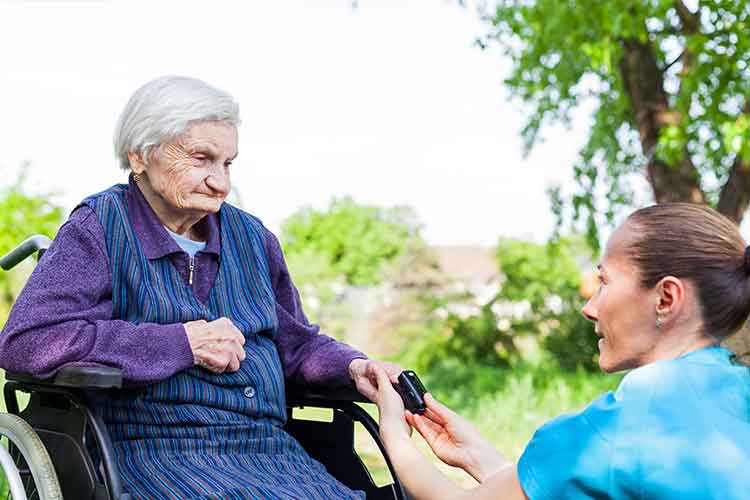Communicating with someone who has dementia can be difficult to navigate, for both the carer and the client.
Dementia is more than just memory loss. It can affect the way a person communicates their needs - from not being able to find their words, to complete loss of language. This can be extremely distressing for the client, and it requires considerable patience on the part of those supporting them (Alzheimer's Society 2021).
Luckily, there are ways you can maintain communication and offer support to these vulnerable clients in your care; ways that will require a touch of extra patience and involvement on your part.
What follows is a series of practical tips on how you can engage respectfully with clients affected by dementia, to best ensure their care needs are met.
Communicating with Someone Who Has Dementia Under the Strengthened Aged Care Quality Standards
Standard 1: The Person - Outcome 1.3: Choice, independence and quality of life (Action 1.1.2) of the strengthened Aged Care Quality Standards requires aged care staff to recognise and gain an understanding of older people’s individual communication needs and preferences (ACQSC 2024a).
Additionally, Standard 3: Care and Services - Outcome 3.2: Delivery of care and services (Action 3.2.9), requires aged care providers to support their staff to:
- Gain an understanding of the ways in which different people communicate, including those with dementia and/or who have trouble communicating
- Effectively communicate with older people both verbally and non-verbally.
(ACQSC 2024b)
1. Environment

Environmental factors can be the difference between a safe and relaxing encounter, and a chaotic and distressing one. Before engaging with your client, consider the following:
- Think of environmental factors that could be a distraction (such as loud TVs or radios, busy crowds or children nearby) and limit or remove these where possible.
- Don’t try to compete for attention. If it is a bad time, such as the middle of a meal or a visit from family, consider coming back later.
- Ensure you have allotted enough time for the engagement. Communicating with someone who has dementia may take longer than is normally expected, and this should be taken into consideration.
- Keep approaches consistent across the care team. Regular routines won’t pose the risk of distressing your client, as opposed to something unexpected or dramatically different in tone.
(Dementia Australia 2024; Better Health Channel 2014; FCA 2016; Alzheimer's Society 2021)
2. Body Language

Words may lose some of their meaning to someone with dementia, however, the majority of human communication is non-verbal Consider the following body language and non-verbal communication factors:
- Stay still and face the person while talking so they can see your face; remain in their line of vision.
- Sit close (but don’t invade their personal space) and get down to their level, where possible.
- Make and maintain eye contact.
- Use friendly and reassuring facial expressions.
- Physical touch, where appropriate, can help to reassure someone or gain their attention.
- Hand gestures such as pointing and demonstrating an action can help communicate an idea or message.
- Use relaxed and open body language, and ensure that your body and facial expressions match what you are saying with your words and tone of voice.
(Dementia Australia 2024; Alzheimer's Society 2021; FCA 2016)
3. Speaking

Much of how people communicate is conveyed in the tone it is delivered in. Remember the following points when speaking:
- Speak at a slower (but not condescending) pace than how you would normally talk.
- Use a pleasant and respectful tone of voice. Remain calm and matter-of-fact.
- Address the person by name, and then identify yourself by your name and position.
- Use the specific names of people and places. For example, say John/Sarah, instead of pronouns, e.g. he/she.
- Stick to simple words and sentences, and avoid medical jargon especially.
- Ask questions one at a time. Try to phrase them so they only require a ‘yes’ or ‘no’ response.
- Allow time for the person to process the question and answer you. If you don’t receive an answer, wait a few minutes and rephrase the question.
- Don’t overload your client with questioning - try and remain light and conversational.
- Include the person in conversations with others who may be in the room. Don’t talk about the person’s care - talk with them.
(Dementia Australia 2024; Alzheimer's Society 2021; FCA 2016)
4. Listening

- Be patient.
- Listen to what the person may not be saying with their words, but with their body. Try to work out the meaning behind the feelings and words they are expressing.
- Don’t be afraid to suggest words if they are struggling to find the right one.
- Actively listen - offer encouragement by smiling and nodding.
- Don’t rush or interrupt the person.
- And, sometimes the best thing to do is just listen and be present.
(Alzheimer's Society 2021; FCA 2016)
5. What Not to Do…
- Don’t ask questions that rely on short-term memory in conversation, such as, ‘What did you eat for breakfast?’
- Don’t argue.
- Don’t be condescending.
- Don’t talk about the client as if they are not there.
- Don’t ignore the person if they have not made sense to you. Always acknowledge and validate their communication, even if you have not understood.
(Dementia Australia 2024; NHS 2023; Alzheimer's Society 2021; FCA 2016)
Additional Tips
- If your client is distressed or agitated, acknowledge how they feel and then try changing the subject or redirecting their attention, e.g. ‘I’m sorry you’re feeling upset. Let’s go for a short walk.’
- People with dementia may recall things that never occurred - for example, they may say their car was stolen. Avoid trying to convince the person that this simply did not happen, but instead focus on the feelings it has caused. The idea may have them agitated, and this feeling is something you can help with.
- Sometimes a client might say something factually untrue, however, the meaning behind the words is true. For example, a client saying they have to go to work might mean that they want to feel useful. Consider this before steering away from a topic of conversation.
- Don’t forget to laugh. Humour is a great ice-breaker and a way to connect. Laugh together over mistakes or misunderstandings, and move on from them.
(Alzheimer's Society 2021; FCA 2016)
Test Your Knowledge
Question 1 of 3
Which one of the following factors is NOT a concern when communicating with someone who has dementia?
Topics
References
- Aged Care Quality and Safety Commission 2024a, Standard 1: The Individual, Australian Government, viewed 4 April 2024, https://www.health.gov.au/resources/publications/strengthened-aged-care-quality-standards-august-2025?language=en
- Aged Care Quality and Safety Commission 2024b, Standard 3: Care and Services, Australian Government, viewed 4 April 2024, https://www.health.gov.au/resources/publications/strengthened-aged-care-quality-standards-august-2025?language=en
- Alzheimer's Society 2021, How to Communicate with a Person with Dementia, Alzheimer's Society, viewed 4 April 2024, https://www.alzheimers.org.uk/about-dementia/symptoms-and-diagnosis/symptoms/how-to-communicate-dementia
- Better Health Channel 2014, Dementia - Communication, Victoria State Government, viewed 4 April 2024, https://www.betterhealth.vic.gov.au/health/ConditionsAndTreatments/dementia-communication
- Dementia Australia 2024, Talking to Someone with Dementia, Dementia Australia, viewed 4 April 2024, https://www.dementia.org.au/living-dementia/staying-connected/talking-someone-dementia
- Family Caregiver Alliance 2016, Caregiver’s Guide to Understanding Dementia Behaviors, Family Caregiver Alliance, viewed 4 April 2024, https://www.caregiver.org/resource/caregivers-guide-understanding-dementia-behaviors/
- National Health Service 2023, Communicating with Someone with Dementia, NHS, viewed 4 April 2024, https://www.nhs.uk/conditions/dementia/living-with-dementia/communication/
 New
New 
